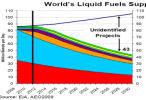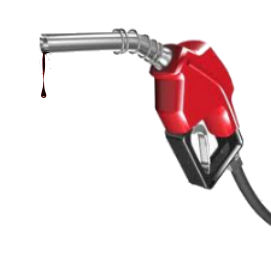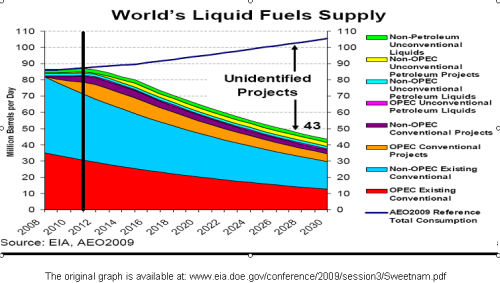 The supply of the world's most essential energy source is going off a cliff. Not in the distant future, but within two years. Production of all liquid fuels, including oil, will drop within 20 years to half what it is today. And the difference needs to be made up with "unidentified projects" – in other words, we face a potential ‘rank shortage’. According to this graph, we stand on the edge of a precipice, with no prior warning from either the industry or governments, which ostensibly protect the public interest.
The supply of the world's most essential energy source is going off a cliff. Not in the distant future, but within two years. Production of all liquid fuels, including oil, will drop within 20 years to half what it is today. And the difference needs to be made up with "unidentified projects" – in other words, we face a potential ‘rank shortage’. According to this graph, we stand on the edge of a precipice, with no prior warning from either the industry or governments, which ostensibly protect the public interest.

Edited and extrapolated from an article by Nicholas C. Arguimbau, 23 April, 2010.
Additional material compiled by Brian McGavin, writer and analyst.
Look at the graph below and worry. It was drawn by the United States Department of Energy (Energy Information Administration) in 2009.
What does it imply? The supply of the world's most essential energy source is going off a cliff. Not in the distant future, but within two years. Production of all liquid fuels, including oil, will drop within 20 years to half what it is today. And the difference needs to be made up with "unidentified projects" – in other words, we face a potential ‘rank shortage’. According to this graph, we stand on the edge of a precipice, with no prior warning from either the industry or governments, which ostensibly protect the public interest.
The original graph is available at: www.eia.doe.gov/conference/2009/session3/Sweetnam.pdf
The graph was prepared for a US Department of Energy meeting in spring, 2009.
Take a good look at what it says:
• We are past the peak of oil production. Conventional oil will be substantially gone in 20 years, and there is nothing secure to replace it;
• Total petroleum production from all presently known sources, conventional and unconventional, will remain "flat" at approximately 83 mbpd for the next two years and then will proceed to drop, at first slowly but by 4% per year after 2015.
• Demand will begin to outstrip supply in 2012, and will already be 10 million barrels per day above supply in only five years. The United States Joint Forces Command concurs with these findings. http://www.jfcom.mil/newslink/storyarchive/2010/JOE_2010_o.pdf.
• 10 million bpd is equivalent to half the United States' entire consumption. To make up the difference, the world would have to find another Saudi Arabia and get it into full production in five years, an impossibility. See The Oil Drum, http://www.theoildrum.com/node/5154
• The shortfall, labelled "unidentified projects," that needs to be filled in 18 years is 60 million barrels per day, equivalent to 3/4 of today's total production, on the basis of a very conservative estimate of only 1% annual growth in global energy demand. Yet the rate of discovery of new conventional oil has been steadily dropping now for FORTY years despite evermore searching with more sophisticated technology.
The curve is virtually identical to one produced by geologists Colin Campbell and Jean Laherrere, published in "The End of Cheap Oil," in Scientific American, March, 1998. They projected that production of petroleum from conventional sources would drop from 74 mbpd in 2003 (as compared to 84 mbpd in 2008 in the DOE graph) and drop to 39 mbpd by 2030 (the same as the DOE).
The world was completely transformed by oil for the duration of the twentieth century, but if the graph is right, within 20 years it will be vastly depleted as we face rising demand and trying to support over 4 billion more people in just 40 years. Here are just some of the issues:
• zero time to plan for the replacement of oil in its essential role in EVERY industry;
• zero time to plan how to replace cars and transport in our daily lives, and distribute agricultural produce and manufactured goods;
• zero time to manufacture and install millions of home energy installations to replace fossil fuel-sourced heating;
• zero time to plan for replacement of the largest military establishment in history, almost completely dependent upon oil;
• zero time to plan for supporting a global population that, at currently fertility rates, is heading for over 11 billion people by 2050 - without the "green agricultural revolution," made possible by the age of oil and where over two billion are already suffering from malnutrition;
• zero time to plan how to re-power tractors essential to producing food on a large scale;
• imperilled water pumping and sewage plants, dependent on fossil fuel energy to work.
In a world without oil that will hit us hard in less than twenty years, there will be few oil-burning ships transporting grain and other goods to the billions now dependent on them, or oil-burning airlines serving the world's major cities and the vital global tourist economy. Yet in September 2011 the Airbus Company predicts that the global passenger plane fleet will more than double by 2030. They are in dreamland. We are heading rapidly towards a minefield of lethal limits with little thought for the future.
The most frequently discussed source of unexploited petroleum is the tar sands of Alberta, Canada, but as a high percentage of their energy value has to be used in their extraction, the quantity of reserves is misleading. Two independent researchers have estimated that production from the tar sands by 2020 may be around 3.3 million bpd to 4 million bpd. Consequently, the likelihood of tar sands making a significant contribution to the world's petroleum demand is low. (Phil Hart and Chris Skrebowski, "Peak oil: A detailed and transparent analysis”. ) http://www.energybulletin.net/node/30537. Tar sand extraction is also very polluting.
Renewable energy. No substitutes for oil have been developed on anything like the scale required, and most are very poor net energy performers. Despite potential, renewable sources (other than hydropower or traditional wood) currently provide less than 1 per cent of the energy used in the world and the annual increase in the use of most fossil fuels is much greater than the total production in electricity from wind turbines and photovoltaics. Oil consumption is now outpacing new discoveries by a rate of around 3:1. (Professor Charles Hall)
So is nuclear power, with its potentially critical contamination risks, the great hope? Nuclear fission generates around 20 per cent of electrical energy needs in many industrial countries – much less in developing countries. Most uranium deposits are found in concentrations of 2% or less. Even a potential doubling in number of fission reactors across the world could see commercially extractable uranium ore run out in just 20 to 30 years.
(David Fleming, nuclear energy analyst)
A transition to genuinely sustainable living and the role of government
The current economic crisis in many developed nations has revealed the fragile inter-dependence of the globalised economy, where many countries can be involved in the supply chain to produce a single component manufactured in one of them. Once plentiful oil supplies are running down rapidly, the 'globalised' economy this has supported will have to rethink completely.
Though the economy and GDP is growing in some places, most of us are no longer getting wealthier and in many countries performance has collapsed. The average wage in the US is less now, in real terms than it was 30 years ago. It is GDP per person that is important. More than 60 countries around the world have seen incomes per person fall in the past decade.
Where is the strategic thinking to build a genuinely sustainable economy in a sustainable environment? We have to recognise that the endless “growth is good” mantra facing a future of rapidly diminishing natural resources no longer serves our future well being. We have to rethink economic growth and the excesses of our globalised economy and manage a transition to a qualitative self-supporting economy that satisfies our needs and works reasonably well without continual growth, with goods lasting as long as possible
A ‘dynamic, steady-state economy’ neither grows nor contracts. The door is open for investments, but they are directed toward activities that promote development over growth. “We need to start measuring exactly what we want to maximise or optimise, and plan for resilience and sustainability.” (Rob Dietz, executive director, CASSE www.steadystate.org)
Ways forward?
There is a vast amount that could be done at the micro and macro scale without impacting on our lives, which would lessen the shock of survival in an energy-scarce world. Alongside the need to stabilise and gradually reduce global birth rates and huge associated infrastructure costs to a sustainable level, we can cut back on so much unnecessary production and product obsolescence. Some reductions many people would welcome. To name just a few:
• less road lighting in the country and reduced but better optics lighting in our towns to preserve the night sky; as well as cutting lighting at night in offices;
• cutting TV advertising screens in supermarkets;
• cutting back multiple TVs installed in bars;
• cutting back the multiple, unsolicited mail-shots falling out of papers and through our doors;
• cutting multiple daily flights on short-haul domestic routes, by using high-speed trains;
• banning further production of gas-guzzling performance vehicles.
Still we carry on with our head in the sands, wasting resources on an epic scale. There has been little forewarning and planning. It is time for communities to prepare for community energy independence, food security – not more office blocks on prime agricultural land, and less growth, not more. Every local and national authority needs to start now to address these huge challenges seriously. Our children won’t thank us for inheriting a world taken to an abyss.


Comments
Tony Boys
Thu, 2011-11-03 12:15
Permalink
You're right! But it won't happen...
nimby (not verified)
Thu, 2011-11-03 13:11
Permalink
No peak oil contingency plans
Brian McGavin
Thu, 2011-12-01 00:37
Permalink
No Peak oil government contingency plans more
NIMBY (not verified)
Thu, 2011-12-01 09:21
Permalink
"Transition Town" green-hypocrites
Gloria (not verified)
Thu, 2011-12-01 21:32
Permalink
Growth lobby infiltrates grass roots and 'alternative' groups
CSI (not verified)
Fri, 2011-12-02 15:07
Permalink
Growthists don't believe in peak oil
Add comment